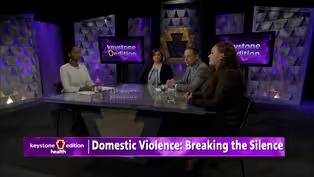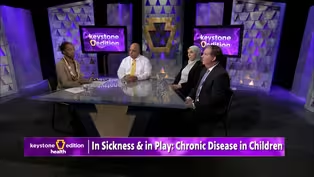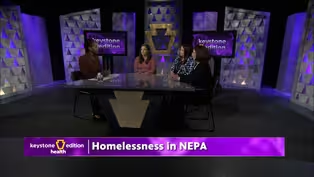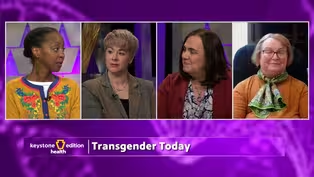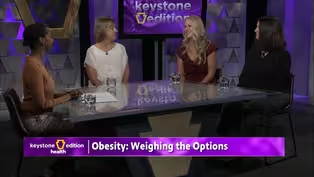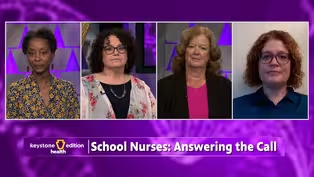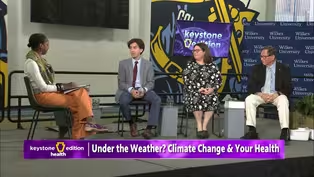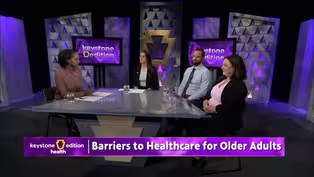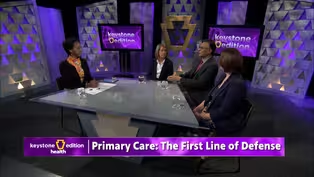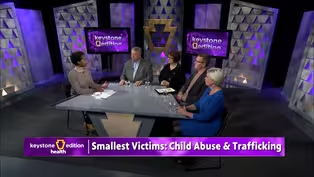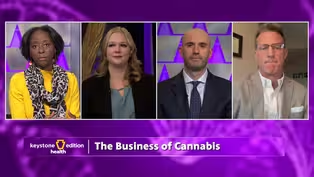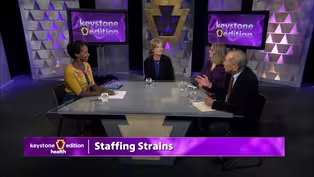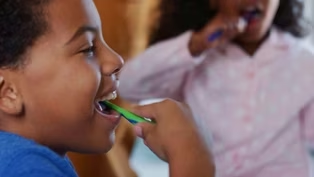Keystone Edition
Dental Care: Brushing Up on Your Health
12/26/2022 | 26m 59sVideo has Closed Captions
How can providers make dental care more affordable and accessible?
Oral health can directly impact overall health, but the CDC reports more people in the United States are unable to afford dental care than any other form of healthcare. How can providers make dental care more affordable and accessible and how can our region’s residents take better care of their oral health?
Problems playing video? | Closed Captioning Feedback
Problems playing video? | Closed Captioning Feedback
Keystone Edition is a local public television program presented by WVIA
Keystone Edition
Dental Care: Brushing Up on Your Health
12/26/2022 | 26m 59sVideo has Closed Captions
Oral health can directly impact overall health, but the CDC reports more people in the United States are unable to afford dental care than any other form of healthcare. How can providers make dental care more affordable and accessible and how can our region’s residents take better care of their oral health?
Problems playing video? | Closed Captioning Feedback
How to Watch Keystone Edition
Keystone Edition is available to stream on pbs.org and the free PBS App, available on iPhone, Apple TV, Android TV, Android smartphones, Amazon Fire TV, Amazon Fire Tablet, Roku, Samsung Smart TV, and Vizio.
Providing Support for PBS.org
Learn Moreabout PBS online sponsorshipMore from This Collection
Healthcare is constantly changing as technology finds new and better ways to help people live longer, healthier lives. Host Tonyehn Verkitus will address the issues that are important to the people in our community, including the ongoing pandemic, concerns about vaccines, food deserts, childhood trauma and child abuse, mental health, environmental issues, and the rising cost of staying healthy wit
Domestic Violence: Breaking the Silence
Video has Closed Captions
Access to the right resources can make facing this challenge a little easier for families (26m 59s)
In Sickness and in Play: Chronic Disease in Children
Video has Closed Captions
About 25% of children in the US aged 2 to 8 years have a chronic health condition (27m)
Video has Closed Captions
Homelessness can happen to anyone at any age or socio-economic status. (26m 59s)
Video has Closed Captions
As we raise the visibility on Transgender young adults and embrace them within our culture (26m 59s)
Video has Closed Captions
Obesity is a serious risk factor many try to avoid when developing healthy eating habits. (27m)
School Nurses: Answering the Call
Video has Closed Captions
What can our school districts do to help retain and recruit nurses for future generations? (27m)
Under the Weather? Climate Change & Your Health
Video has Closed Captions
How does climate change impact individual and public health? (54m 59s)
Barriers to Healthcare of Older Adults
Video has Closed Captions
What progress have local organizations made in addressing these challenges? (27m)
Primary Care: The First Line of Defense
Video has Closed Captions
When was the last time you saw your primary care doctor? (27m)
The Smallest Victims: Child Abuse & Trafficking
Video has Closed Captions
What are the signs to know to spot child abuse and even possible trafficking? (27m)
Video has Closed Captions
What does the cannabis industry mean for Northeastern and Central Pennsylvania? (26m 59s)
Video has Closed Captions
Low staffing levels can lead to burnout among healthcare workers (27m)
Providing Support for PBS.org
Learn Moreabout PBS online sponsorship- [Announcer] Live from your Public Media studios, WVIA presents "Keystone Edition Health", a public affairs program that goes beyond the headlines to address issues in Northeastern and Central Pennsylvania.
This is "Keystone Edition Health".
And now, Moderator Tonyehn Verkitus.
- Good evening, and welcome to "Keystone Edition Health".
I'm Tonyehn Verkitus, thank you for joining us.
Your oral health can have massive implications on your overall health, but many of us skip the dentist to save money.
Tonight, we'll talk about the importance of dental care and how we can make it more affordable and accessible for all.
But first, let's hear from WVIA's Paul Lazar.
- [Paul] Oral health professionals recommend at least two trips to the dentist each year, but the CDC reports more people in the United States are unable to afford dental care than any other form of healthcare, and tooth decay is one of the most common chronic diseases in both children and adults.
They report many people either cannot afford to pay out of pocket for dental care, do not have dental insurance, or cannot get time off work for dental care.
While the American Dental Association advocates nationally to make dental care more affordable, especially for those on public insurance programs, individual organizations can take steps to provide low-cost dental care to those who need it.
For "Keystone Edition Health", I'm Paul Lazar.
- Joining us tonight, we have Dr. Aiman Aslam, a dentist with the Scranton Primary Health Care Center, Dr. Satya Upadhyayula, Clinical Director of The Wright Center for Community Health, Oral Health Clinic, and Kelly Ranieli, Executive Director of Volunteers in Medicine in Wilkes-Barre.
Thank you all for joining us tonight and happy holidays.
- You too, thank you for having us.
- Kelly, can you tell us a little bit about Volunteers in Medicine?
I know you have the dental program, but if you could just give us an overall description of Volunteers in Medicine.
- Sure, so Volunteers in Medicine is a 501c3 nonprofit organization established in 2008.
So 14 1/2 years ago, we opened to provide free medical, dental, and behavioral health services to low-income working families.
Those that are working very hard, they're not eligible for Medicaid, but they just can't afford any type of health insurance.
We opened the medical clinic and quickly realized that we needed to provide dental care.
And the dental clinic, which is all services are free, opened in 2011.
- And Satya, at The Wright Center, how long has the dental center been there?
And approximately how many people are you seeing?
- It's been there for about 12 years now, but then they started off with pop-up clinics, a full-fledged clinic.
At this point, we have two clinics that are fully running, and we do have two residents that we train every year with the post-doctoral residency program.
But you know, we do see about 30 patients each clinic every day basically.
So that's about 60 patients for two clinics.
- That's quite a few patients.
And what about you at the Scranton Primary?
- Scranton Primary Health Care is one of, I think maybe the only federally qualified health center in the area.
We also see medical, dental, behavioral health, and people really from all walks of life.
People that, you know, they've been struggling to find dental care and they finally found somewhere where it didn't matter whether you have insurance or not, people that have private insurance, everybody.
- And about how many patients are you seeing regularly?
- I see 20 to 30 patients a day myself.
And on top of that, we have three hygienists.
We have expanded function dental assistants.
Those are dental assistants that have even further training and they're able to even help with placing fillings.
Yeah.
- So you're a little unique because you used to be fully volunteer dentists, correct?
But now you have a part-time dentist, I believe.
- We were.
So we're not federally funded.
We operate primarily with donations and grants and proceeds from special events and volunteers.
So recently, we were able to get funding to hire a part-time paid dentist.
So he's there a couple days a week, but he collaborates with about 10 volunteer dentists that see our patients on a daily basis.
And it's interesting because all of the volunteer dentists have very busy private practices, but they close to come over to our clinic and provide care because they know how important dental care is.
- And how long have these volunteers been with you?
- Well, we've been open for 14 1/2 years, and we have over 100 core volunteers and most of them have been with us from day one.
So it's pretty amazing.
(chuckles) - So let's just talk a little bit about oral healthcare in general, right?
And then we can talk about the clinic.
You're seeing kids.
What types of things are people not doing at home that they should be doing on a regular basis?
Do you wanna answer that?
- First is basics.
Basically, brushing twice a day.
It's hard with young children, especially to get to two times a day every day.
Flossing is the other thing, you know, and mainly following up with their dentist two times a year is one of the things.
But I do see a trend where they do come in at least once in a year, most of them at least.
But those are the things I do notice.
- [Tonyehn] And for the children you're seeing, have most of them not been to a dentist in a while?
And what sort of complications are you finding?
- That's a good question 'cause I think actually, dentists recommend that either by the first tooth or the first year you go see a dentist.
And that's not necessarily because you know you have tooth decay, it's to familiarize the child with the dental setting.
You know, it's just because when you go to a dentist, you're in the most vulnerable position there is.
You're laying down, right?
So we wanna see kids so that they get used to even going to the dentist.
So I would say that is step one.
Step two is even if your child is putting up a fight, to kind of join them on that fight, try to make it fun.
Even if it's not a successful brushing event, you know, just make sure that they're brushing twice a day so that slowly, it becomes a habit in their lives.
So I would say that that's like one of the biggest things that if you don't do, there's consequences down the road 'cause we see if as a child, you know, you're scared of the dentist, that has consequences as an adult as well.
- Can you actually talk a little bit about the dental van that goes to the schools?
How often is the van going out?
If children have complications, are they coming back to The Wright Center later?
- Driving Better Health is the mobile dental van that goes to school-based programs we do at least twice every month.
Usually, most of the times, the hygienists go and do their exams and cleanings.
If they do see any dental caries, decay, or gum disease, basically they do refer to our clinic, or if they have their own dentist, they do refer them there.
But that's basically how it works.
- To learn more about what local organizations can do to make dental care more accessible, WVIA visited Benco Dental to talk about the Benco Family Foundation.
- Our Benco Family Foundation started about a decade ago when we thought that, you know, we wanna reflect what most really good family enterprises do.
And most of them have a charitable effort that enables them to give back to the community.
As a family owned business, we're really fortunate that we get to be here in Northeastern Pennsylvania and serve a great group of people like the dental community.
The foundation was a natural extension of that.
It enables us to give charitably to all kinds of local causes.
And when it comes to dental work specifically, we love to support the local dentists in doing what they do and doing it for the community that needs it.
So two projects that come to mind are we were very big supporters of the volunteers in medicine the VIM in downtown Wilkes-Barre to do some not just dental care, but medical care to the local community.
We also were big supporters of the hygiene school at LCCC in Luzerne County.
And then finally, every couple of years there's a program called Missions of Mercy that goes around the state and it did it was in Northeastern Pennsylvania about two years ago and that's the biggest single charitable event for the whole state around dental care.
And they serve thousands of patients over a two day period of time.
And we were very supportive in donating product and making sure all the equipment was up and running successfully.
So the number one access to care barrier is probably cost.
The other one is whether or not people have dental insurance.
And then finally, it's maybe getting access to the dentist 'cause not every community has enough dentists in it.
So those are the three.
And the nice thing about the charitable efforts are that they really address the cost issue and the dental insurance issue because people generally have dental insurance when they're employed.
So, if people unfortunately are not employed or self-employed they may have trouble getting dental insurance.
No, we're just proud to be part of the local community, the local fabric and we're really proud to support the local dentist and the local community in doing what they do.
Now Kelly, you mentioned that your services are free.
Can you tell me how people become eligible, and does it matter whether or not people have insurance?
- So in order to be eligible for free services at Volunteers in Medicine, we do have an annual screening process.
So our patients are working, their income is under or at 200% of the Federal Poverty Guidelines, and they're uninsured.
Because our services are free, we don't bill insurances.
So they are uninsured.
So it's that population that are still fallen between the cracks of the healthcare system.
They work, like I said, so they're not eligible for Medicaid, but they just can't afford any type of insurance.
So we do have a screening process where they provide proof of their household income, but nobody's turned away.
We have a behavioral health program.
So if somebody's not eligible, we will make sure that they can meet with our social worker and we can provide them with the resources they need.
- And are you seeing full families?
- Well, we do, but the majority of children can get insurance through the CHIP program.
- Right.
- But we do go out, it's called the Healthy Smile Program.
So we do go out to schools, daycares, private schools, different agencies, non-profits, and we educate children on how to brush their teeth and we educate about 2,200 children a year.
You know, it's so important to start when they're small so... - Yeah.
So Satya, let's say someone comes in, they have some decay.
You're probably doing extractions, but are you going as far as doing oral surgery for people?
- Yes, so if there's just decay, initial decay, we first do fillings, we do also offer root canal procedures.
But then if it's comes to a stage where it's non-restorable, we do offer extractions in-house.
Both our dentists and then there's a new dentist that has joined us, they do have training in oral surgery and oral surgical procedures, and then they are comfortable with doing extractions.
I myself have a one-year additional training, which is done at University of Maryland.
So I'm pretty comfortable with surgical extractions as well.
So we try to keep it mostly in-house and get all the procedures done.
- And are you doing that sort of procedure as well, or do you have to refer people externally?
- So we focus on, I guess you could say primary dentistry.
Extractions, fillings, of course, education is incredibly important, cleanings.
We also do offer dentures, which is life-changing.
But as far as maybe an extraction of a wisdom tooth, we do do a limited root canals.
But some different types of services, we would refer out.
- Now you already mentioned that when people come to the dentist, they're feeling very vulnerable.
- Yeah.
- How do you help people feel more comfortable?
And if people haven't seen a dentist in 10 years, let's say, they're dealing with lots of different issues.
- Well, I guess I should start off by saying that I myself come from an underserved family.
When I was 16, I had to pay for my own braces because my mom and my dad, like bless them, they had five kids, they did the best that they could, but they couldn't afford for me to get it.
So I know what it's like coming from a background where oral health wasn't at the top, and the family knows that it's important, but they weren't able to prioritize it for whatever reason.
So what I try to do is meet patients where they are.
I want them to know that when they come, that I'm not judging them.
No matter how far gone they think that their smile is, I wanna do the best that I can to get them to a point where they're happy to smile again and be healthy again.
Yeah.
- So I would guess that you're pretty passionate about the work that you do.
Did you choose this because of your past, or what brings you in every day?
- Oh, absolutely, I love that in dentistry, there's a big rehabilitation aspect to it.
Yes, it's maintenance, yes, it's preventative, which is extremely important, but you have the opportunity to really transform someone's life.
You might change their life in ways that might seem small to me.
As in it might be that 30-minute appointment, but a chipped front tooth might be nagging at them all day or you know, affecting how confident they are going for a job interview.
That's why I love dentistry.
- So you see people for dentistry, for behavioral health, for medical care.
You probably have some success stories that you can share.
Folks who maybe came in and one way or another, now have gone out into the world and done better, maybe even donate now.
- Yeah.
Well, recently, we had a patient come to us who had missing front teeth for many, many years, and we provided her with dentures.
And there wasn't a dry eye in the whole entire clinic when a week before her wedding, she had a beautiful set of dentures, and she said it would be the first time she smiled in many years and she would smile for her wedding pictures.
So you know, it's just life-changing.
- I can imagine that this work might be stressful at times.
How do you deal with your personal stress while also dealing with your patients?
- Yeah, it could be stressful at times, but spending time with family, you know, talking to friends is mainly how, you know, I balance it.
But apart from that, you know, brushing up on topics.
I do reading at times, but then play badminton.
You know, those kind of things keep me going.
- And how do you support your staff as well, especially if they're volunteers so they're not there all the time?
- Well, I think the mission of Volunteers in Medicine is, you know, it's providing free healthcare to low-income working families.
They're working so hard.
They may have an income of $20,000 of a family of four.
You know, they're just trying to make ends meet.
So I think the mission really has allowed us to recruit volunteers, and as I mentioned, some of them have been with us for 14 1/2 years.
So it's just, you know, the formula's simple.
It's one person helping another.
- You did mention that a lot of your income comes from fundraisers.
How much does it cost to build a dental facility like you have?
- So again, we were very fortunate to purchase the building that houses the Volunteers in Medicine clinic, and we're in a part of it and the dental clinic is also in a section of the building.
And I mean, this was back in 2010.
I mean, it cost a couple hundred thousand dollars.
Today, that's gonna be a lot more.
(all laughing) - You currently have two locations.
I believe you said there's a third on the way.
Where will that be?
- Yeah.
So that's gonna be in Wilkes-Barre.
It's gonna be expected to start in, you know, end of the year, 2023, that's the plan.
It's gonna be the largest.
Firstly that it's gonna have 10 operatories.
Plan is also to store a pediatric dentistry residency program.
So that's in the works.
- And do you have any plans for expansion?
- So we do have one additional clinic, and that's already underway.
- Okay.
- Mm-hm.
It's on Alder Street in Scranton.
- And how do people become eligible for services with you?
I know for you, it's screening, but you said people can come even if they do have insurance.
- Yeah, so the entire scale, basically, you could come with your insurance.
If you don't have insurance, we have something called a sliding scale.
That means you pay based off of your income.
So if you truly can't afford, we do root canals as well, you're gonna pay based off of what you can afford.
You're gonna get a massive discount, which is amazing.
Like there's so many people there that come and they're baffled at how we can offer these services at the prices that we do.
And it's in incredible service to be able to offer it.
- Do you also offer a sliding scale?
- It does, so Wright Center is a FQHC look-alike.
So basically the same principles with respect to payment and finances, but then in addition to what Aiman said, we do also have payment plans.
Let's say, I'm pretty sure you guys do too, but then it doesn't have to be like this much amount.
Basically whatever they can afford to pay is gonna be set up every month.
- So we've talked about the fact that you all may have to refer people out sometimes.
Are there folks that are volunteering to do those services or are they offering discounts?
- That actually is pretty tough.
So the tough part is when you really, really wanna do something, but you know you have to send to somebody more trained than yourself and you have to humble yourself at that point, and that's the tough part of the job because it's out of your hands once they go to another clinic.
But you guys, do you feel differently about that or?
- No, I mean, you know, Volunteers in Medicine were for the community by the community, and we've been very, very fortunate to have specialty providers, endodontist, oral surgeon, you know, all sorts of help because people get our mission.
Benco Dental was very helpful to us when we first opened, and both healthcare systems, Geisinger Wilkes-Barre General are very supportive of us.
So you know, we just do our best.
You know, our patients are uninsured, so we just do our best to make some phone calls and you know, ask for favors, honestly.
- It actually sometimes takes that extra mile to go and actually make connections with these specialists in the area.
So if you truly recognize somebody needs specialist care, that comes in help at times.
- Well, I guess that leads to a good question.
Do you all accept donations?
And if people wanted to volunteer or make donations, how do they do that?
- Well, we're at 190 North Pennsylvania Avenue in Wilkes-Barre, so anybody's more than welcome to walk in.
We do have a website and you know, they can call.
But I mean, that's how we operate with mainly volunteers.
And like I mentioned, we're a 501c3 nonprofit.
We're not federally funded, so we only operate with donations and grants and proceeds from special events.
So we're always looking for help.
- Scranton Primary as well, I believe, takes donations.
I don't handle the financial portion of it, but I would welcome anyone to also visit 959 Wyoming Avenue.
I'm pretty sure they do on the website.
- Do you take volunteers though if you have hygienists or?
- We don't have volunteers as yet.
- M'kay, just curious.
- Same with The Wright Center.
The website has donate as option there.
That's one way to do it as far as I know.
- And as far as your patients, do either of you have success stories that you'd like to share?
- Oh, yeah.
I love restoring smiles through dentures because that is so transformative for patients.
I had alluded to before, I had a patient, she came in with a chipped tooth, she had a job interview and she was like, "Dr. A, I just need you to fix this tooth so that I have some confidence for my work interview."
And it's a simple procedure for me, but it really is life-changing for her.
And she got the job, so that was like sealed all the deal for me.
(laughs) - Similar story, but there was basically this patient with rampant decay, doesn't brush every day because of sensitivity.
And it's a circle, you know, because of not brushing, more and more decay is happening.
So we started to basically perform the treatment and stages, and basically stabilize the disease first from progressing.
For their front teeth, offered root canals and crowns, and that actually boosts self-esteem quite a bit.
You know, that's really important.
It's first step, you know, anybody sees in if you go to a job interview or something, or to just be confident and believe in yourself.
I think that helped him.
- I mean, I feel like it's something that we take for granted.
I go for my twice yearly visit and don't even think about it.
Sometimes, I cancel and go a month later.
But I would imagine that there's people who show up and maybe they've been too embarrassed to go to a dentist.
Do you see that as well?
- Yeah.
Yeah, and I was just thinking about a gentleman who came to the clinic, and he had a large tumor underneath his tongue.
So we saw him immediately, we got him a biopsy, we got him in to see a specialist.
And unfortunately, it was cancerous, and we worked with one of the local hospitals to have surgery.
And two days after he had surgery, he rode his bike to the clinic to say thank you.
- Aww.
- Yeah.
Again, there wasn't a dry eye in the clinic, but yeah, yeah.
And he had this tumor, he didn't have insurance, so he had this tumor, and I mean by the time he came to Volunteers in Medicine, it was very large.
- Oh, my.
- People are so sweet.
With Christmas around the corner, like I'm sure you guys too, like cookies, gifts, chocolates.
Stuff always comes pouring in, and people are so thankful and grateful that they finally have somewhere where they can go, where it's a judgment-free zone because you have to meet people where they are.
Like same with my family, a part of why I got into dentistry is understanding that not everyone's coming with the same toolbox, you know.
So you have to meet people where they are.
- Right.
- Circling back to what Kelly said, so basically the tumor was so big, she was saying.
That is one of the important parts of where periodic visits become really important because oral cancer screening is one part of it.
We could identify that in early stages, and you know, it's a better prognosis when identified earlier.
- Is this something that happens often?
I actually didn't even think about the fact that someone could go to the dentist, and then discuss a tumor.
- Yeah, yeah.
- Absolutely, so every new patient and periodic exam, we always do an oral cancer exam because oral cancer is very sneaky.
It likes to hide behind the tongue.
People normally aren't looking there in the mirror for bumps and lumps and different color changes.
So we're definitely paying attention to that.
- So in essence, we wanna make sure that we're going to the dentist twice a year.
If someone needs service, they can come see you.
And we thank you for providing that service to the community.
For more information, you can visit the websites currently on the screen.
I'd like to thank all of our guests for joining us tonight.
For "Keystone Edition Health", I'm Tonyehn Verkitus.
Have a good evening.
(calm music) (machine hissing and beeping)
Dental Care: Brushing Up on Your Health - Preview
Preview: 12/26/2022 | 30s | Watch Monday, December 26th at 7pm on WVIA TV (30s)
Providing Support for PBS.org
Learn Moreabout PBS online sponsorship
- News and Public Affairs

Top journalists deliver compelling original analysis of the hour's headlines.

- News and Public Affairs

FRONTLINE is investigative journalism that questions, explains and changes our world.












Support for PBS provided by:
Keystone Edition is a local public television program presented by WVIA
